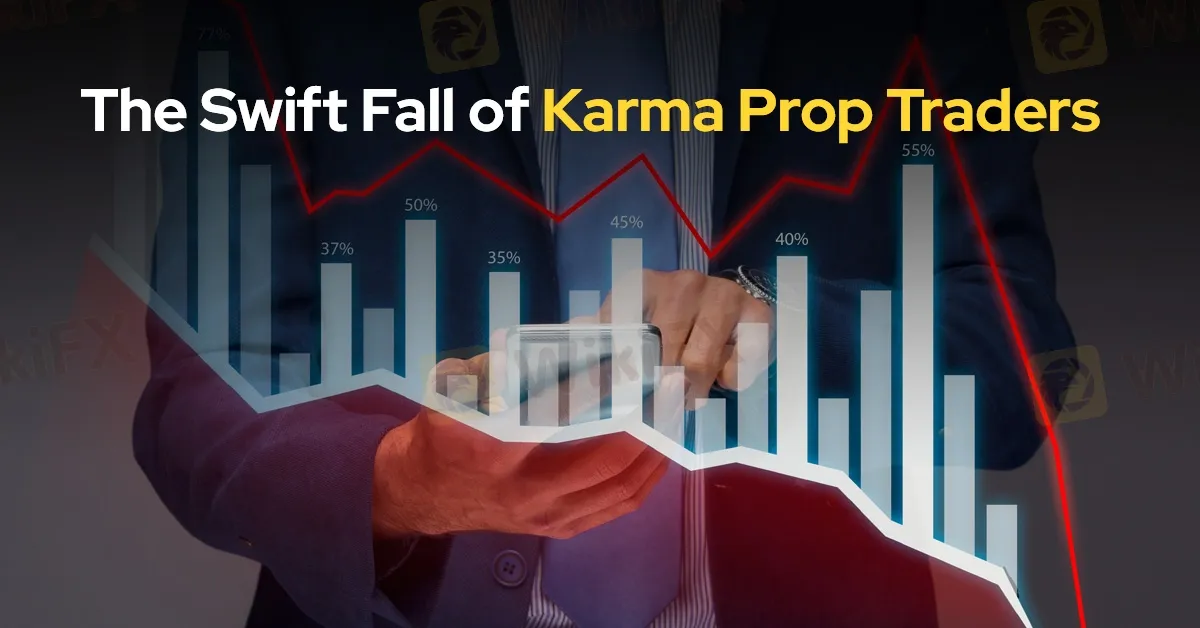简体中文
繁體中文
English
Pусский
日本語
ภาษาไทย
Tiếng Việt
Bahasa Indonesia
Español
हिन्दी
Filippiiniläinen
Français
Deutsch
Português
Türkçe
한국어
العربية
The Swift Fall of Karma Prop Traders
摘要:The rapid demise of Karma, a prop trading firm that collapsed just weeks after significant updates, underscores the challenges and fundamental flaws within the proprietary trading industry, highlighting a broader trend of closures and sustainability issues.

In a dramatic turn of events, prop trading firm Karma has announced its abrupt cessation of operations, just a week after launching a new trading platform and several significant updates. The company's founder, Eshan Balapatabendi, has publicly stated that while he started Karma with “good intentions,” unforeseen challenges rendered the business “unsustainable.”

Karma's rise and fall in the trading world was extraordinarily rapid. Despite receiving favorable reviews, the firms existence was short-lived, spanning only two months. The company's recent developments included a partnership with Match-Trade Technologies, aimed at integrating the Match-Trader platform with TradingView. Additionally, Karma had introduced five major updates that were either in progress or slated for the near future. The sudden decision to halt operations comes as a surprise, given these recent advancements.
Balapatabendi reflected on the firm's closure, explaining that the company was hindered by several obstacles. One significant issue was the failure of a promised technological solution from an unnamed provider, which led to a substantial financial drain over four months. Furthermore, Karmas initial launch revealed critical flaws in their risk management checks. This oversight allowed traders who should have been filtered out during Phase 1 and Phase 2 to pass through, including potential fraudsters. Consequently, these issues contributed to severe cash flow problems and left the company facing liquidity challenges.

Efforts were reportedly made to find external buyers interested in acquiring Karma, but the founder chose to decline these offers. Currently, there are ongoing efforts to ensure that traders who earned profits legitimately will receive their due payouts.
Karma's sudden closure is not an isolated incident. The prop trading industry has witnessed several high-profile closures recently. For instance, Funded Engineer ceased operations in mid-July despite attempts at strategic restructuring. Similarly, True Forex Funds and SI World also exited the market earlier this year.
Industry observers suggest that more than 50 proprietary trading firms might have vanished from the market in 2024 alone. Alex Zanutto of FunderPro attributes these closures to fundamental flaws in the traditional prop trading model. According to Zanutto, many firms operate under a virtual trading system where traders' trades do not reach the real market, resulting in no actual profits. Additionally, some firms might manipulate market conditions to ensure traders fail their challenges, with payouts primarily sourced from challenge fees rather than genuine trading profits.
Zanutto criticized the industrys prevalent “sell as much as you can” strategy, which often includes promises of easy money. He emphasized that trading requires significant effort and time to master, and not every aspiring trader is suited for funded trading opportunities. Just as not everyone can qualify for the Olympics, not everyone is meant to succeed in the prop trading sphere.
As the prop trading industry continues to face these challenges, the rise and fall of Karma serve as a stark reminder of the complexities and risks inherent in this sector.

免責聲明:
本文觀點僅代表作者個人觀點,不構成本平台的投資建議,本平台不對文章信息準確性、完整性和及時性作出任何保證,亦不對因使用或信賴文章信息引發的任何損失承擔責任
天眼交易商
熱點資訊
詐騙注意!外匯券商XM出現仿冒平台,使用前務必確認官方網址
外匯交易新手入門:從零開始打造你的交易之路
英國外匯券商Dupoin提供30美元歡迎贈金,適合新手投資人使用嗎?
FxPro與tell.money合作,為BnkPro客戶引入CoP功能
資深外匯券商Roboforex爆交易糾紛!一夜之間態度丕變,拒絕出金、封鎖帳戶、客服失聯樣樣來
InterStellar Group星際好評如潮,該平台是否值得信賴?監管情形、用戶評價、交易環境一次看
外匯市場的監管體系:在岸與離岸有何區別?
Rich Smart這家券商值得信賴嗎?立即查看平台監管情形、用戶評價、交易環境
匯率計算






